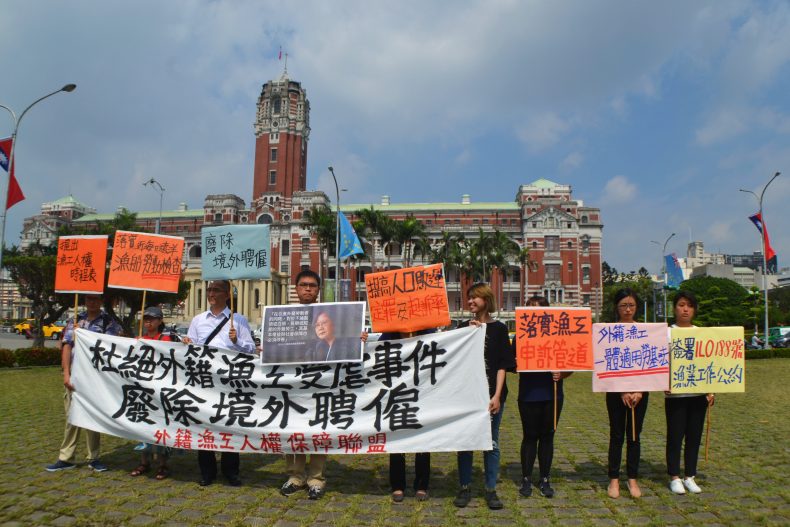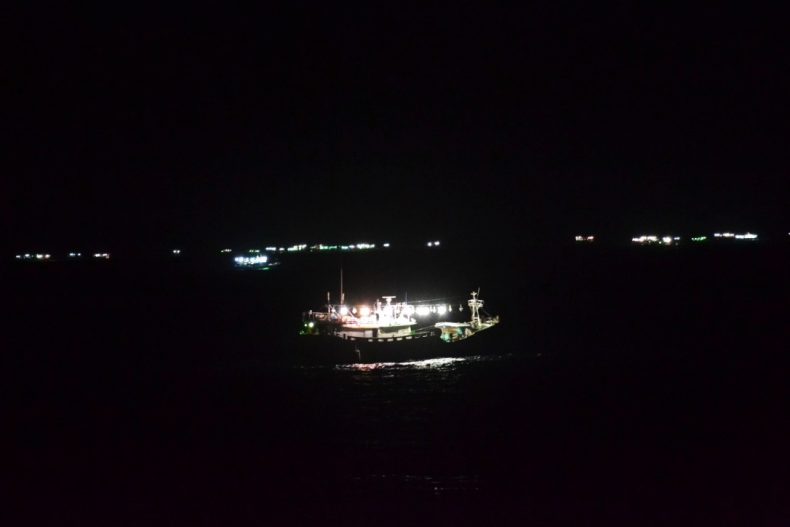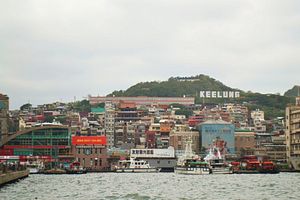In recent years an increasing number of reports have come out about migrant fishing labor violations occurring on Taiwanese-flagged vessels. These reports are part of a larger body of journalism focusing on the symptoms of a global fishing industry that has been largely left outside of world regulation standards and exists within an environment traditionally difficult to enforce.
The reports are the same: garnished and unpaid wages, confiscated identification, verbal abuse, beatings, and rumors of murder at sea are common. Equally common to the reports are the tactics Taiwanese-owned fishing vessels use to escape persecution. Flags of convenience, nonregistration of vessels, turning off transponders, and spending time on the high seas where no nation’s jurisdiction can reach are all tactics employed to skirt around the law and continue exploiting migrant labor. Many of these cases are textbook examples of human trafficking. Workers are coerced or forced to stay in dismal working conditions against their will, moved about the oceans, threatened with violence, and kept from going ashore in some cases.
To most of the world Taiwan is portrayed as a flourishing multiparty democracy that has come to terms with the excesses and abuse of its authoritarian past, becoming a paradigm of progressivism in Asia. In many ways its image is well-earned. In 2017 its courts ruled in favor of same-sex marriage, a first in Asia. Its legislature features one of the globe’s highest rates of representation by both women and indigenous peoples. By all rights it has earned credit where it’s due. It is curious then, that such widespread abuses and violence are permitted to occur under its flag, at complete odds with the image it works so hard to cultivate. What is even more perplexing is that the Taiwanese are not aware of it. But therein lies part of the problem.
In 2017 Taiwan passed the Labor Standards Act, a measure meant to empower enforcement of labor violations within Taiwan’s jurisdiction. The problem: Several years earlier Taiwan’s legislature voted that distant fishing vessels no longer fell under Taiwanese jurisdiction. The island’s precarious international position and domestic political indifference have contributed to the problem. Equally frustrating to NGOs monitoring the situation in Taiwan is that the Act is not being enforced to the letter because of resource constraints and bureaucratic confusion.
Taiwan’s systemic inertia has created the perfect environment for the continued exploitation of migrant fishermen by brokers and commercial fishing associations. The conditions go from bad to dire.
This past spring the Environmental Justice Foundation, an international nongovernmental organization focusing on the nexus of environmental exploitation and human rights issues, released their second short documentary on Taiwan’s migrant fishermen crisis, “Exploitation and Lawlessness: The Dark Side of Taiwan’s Fishing Fleet,” which highlights the lack of legal oversight by Taiwan’s government for the booming industry and its systematized forced labor, depicting the shocking conditions and abuse migrant workers endure on Taiwan’s fishing boats.
A 2015 series by Ian Urbina for the New York Times entitled “Outlaw Ocean” paints an even darker picture, placing at least one Taiwanese fishing vessel at the site of a grisly murder at sea, captured on video, of four men gunned down while floating on debris in the ocean.
The exploitation and abuses happening aboard Taiwanese fishing vessels are not unique. The reports in recent years reflect a systemic problem within the global fishing industry. What makes the Taiwanese issue more interesting is the disproportionate rate in which its fishing vessels seem to appear in stories of abuse, a fact Urbina corroborated during his reporting for the New York Times series and for a forthcoming book on the same subject.
“[T]ime and again [Taiwanese fishing vessels appeared] in lots of different places: The coast of Africa, South America, the Philippines, elsewhere — I was encountering workers who had experienced pretty egregious conditions on long haul fishing ships, and Taiwanese tuna longliners seem disproportionately represented in those stories that I was hearing,” he commented for this piece.
“Quite often these were Taiwanese tuna longliners that were fishing the waters between South Africa and Uruguay and I’m not sure why that is.”
Why Taiwanese vessels have suddenly become a media trend may be due to the openness of reporting in Taiwan, the disproportionately large size of Taiwan’s domestic fishing fleet, or the jarring juxtaposition of human trafficking happening under the flag of a flourishing democratic system. Regardless, the issue is severe and attention to it is growing.
The high rates of abuse in the reports from EJF and Urbina are substantiated by Allison Lee, secretary of the Yilan Migrant Fishermen’s Union, based in Taiwan’s Yilan County. She pointed out that the severity of abuse and violence varies depending on the type of work.
“The industry can be very violent for migrant workers. Offshore fishing is very violent. Onshore fishing is not as bad, but even if beatings don’t occur the captains may have bad tempers and verbal abuse is regular” she stated.
“Inshore, approximately 60 percent of the fishermen experience some sort of abuse.”
She estimated that the rate for deep water fishing is much higher.
Those who complain often find that they are powerless. The labor union itself is severely understaffed and operates on a volunteer basis. It is the only union representing migrant fishermen in Taiwan, and workers from ports all around Taiwan seek out the union for aid. Nonmembers are not turned away, but it makes the work more difficult. The result is that volunteers are under great pressure. Complaints often find their way back to brokers and ship captains who dole out additional abuse.
The Yilan County Labor Bureau, where the union files its complaints, has been slow to take this problem seriously, particularly in instances where abuse happens out of their jurisdiction.
There is some sign that it is changing. In 2017 Lee was commended for her work by then-U.S. Secretary of State Rex Tillerson and the president’s daughter, Ivanka Trump, in Washington. The bureau in Yilan has been taking her filings more seriously since then.
Is the job dangerous for advocates? Not particularly, according to Lee. Her job is not difficult, she explains, but she receives harassment from the industry’s side.
“They bother me because I’m bothering them,” she laughed.
She wants people who hear of these stories of abuse to know that it’s a very small number of corrupt people who are responsible for this problem: “We Taiwanese are not like these people. We have to be aware and not support this criminal behavior. If we know something is wrong we have to speak up.”
She believes many Taiwanese care. She’s seen it, and she’s worked with them. “Why do we have these people who live like slaves? Taiwanese have good hearts.”
In 2009 Taiwan passed the Human Trafficking Prevention Act, but there were still many gaps that NGOs and advocates sought to fill. Taiwan’s Legislative Yuan passed the 2017 Labor Standards Act in order to address the inadequacies in the existing law and bring about a change in the way that cases of abuse were handled by the government. But its implementation has been empty, according to NGOs, and there is still much more work that needs to be done before migrant labor violations can be halted.
In early 2018 representatives from Greenpeace, the Environmental Justice Foundation, the Yilan Migrant Fishermen’s Union, the Presbyterian Church of Taiwan Seamen and Fishermen’s Service Center, Serve the People Association, the Taiwan International Workers’ Association, and the Taiwan Association for Human Rights established the NGO coalition Human Rights for Migrant Fishers. This group began a regular series of meetings in order to determine how to best address the lack of enforcement of the 2017 law.

Human Rights for Migrant Fishers demonstrates in front of the Presidential Office Building (May 17, 2018). Photo by James X. Morris.
The biggest problem is that agencies do not enforce cases retroactively, leading to a grandfathering mentality.
“People are still suffering now,” said Lee, who has traveled to Indonesia to investigate the contracts that are being signed with brokers since the passing of the Taiwanese law. Finding new cases to prosecute can trigger retroactive adjustments for ongoing abuses.
“We can’t ignore the problems. It’s unbelievable. Industry is overprotected. Agencies, vessels and their owners — the whole industry. This law needs to be implemented,” she stated.
Taiwan’s commercial fishing industry is organized like a swarm of small and medium enterprises (SME). Because of the SME nature of the industry, and particularly due to Taiwan’s heavy reliance on seafood to feed the island’s 23 million inhabitants, these fishing companies, vessel owners, and captains have formed commercial fishery associations, groups that enjoy a cozy relationship with the central government’s Fisheries Agency. The associations are provided with subsidies for fuel, supplies, and funds by the central government to offset the costs of operating crucial SMEs on the oceans. Government funds are used to pay the migrant laborers, but are first funneled through the brokerage firms responsible for filling the ships with hands.
The relationship between commercial fishing associations and brokers who supply the industry with its cheap workforce is equally comfortable. Brokers receive payment from the fishing associations only if they can fill quotas set by the associations. The associations give the workers’ pay to the brokers, who then implement their own tiered system of service fee schemes based on work experience. Many complaints indicate that brokerage firms are skimming additional money from migrant fishermen’s income.
A major problem in tackling human trafficking in Taiwan’s fishing industry is acknowledging the size of the problem. According the EJF, Taiwan’s Fisheries Agency counts approximately 26,000 fishermen working on its vessels. By comparison, U.S. figures for Taiwan’s fishing fleets indicate that approximately 160,000 people work on Taiwanese fishing boats.
“I’m more inclined to believe the American figures,” said Lee.
This discrepancy of approximately 134,000 people highlights the problem Taiwan faces in understanding just how bad its human trafficking problem really is. Most migrant fishermen on Taiwanese boats are recruited through poorly regulated channels, making the figures more difficult to tabulate.
An EJF briefing published in March highlights some of the systemic issues occurring in Taiwan’s fishing industry. They report that Taiwan has one of the world’s largest fishing fleets, with more than 1,800 vessels flying their own flag, plus hundreds of other Taiwanese-owned vessels sailing under flags of convenience. Taiwan’s distant water fleet operates far from home, and the report indicates many of the catches are offloaded in other countries such as Thailand and Mauritius. A spokesperson for EJF indicates that they have made progress working with Thai authorities, including more rigorous port inspections and proactive measures by the navy.
The EJF report indicates that nearly 90 percent of Taiwan’s distant water vessels fish for tuna in the Pacific, Atlantic, and Indian Oceans. Far in the deep sea, these vessels can spend years away from port with the help of trans-shipments of goods and cargo, making migrant workers on these boats among the most exploited and vulnerable.
Most migrant fishermen in Taiwan are from Indonesia and the Philippines. For the fishermen, the journey begins at home, where a network of local brokers connected with Taiwan-based brokers have arranged quotas with Taiwanese fishing associations. The migrants pay fees to the brokering firms to start their jobs, and continue to pay fees to the brokers while they are employed. Upon arrival in Taiwan the brokerage firms typically collect personal identification documents including passports and Alien Residency Cards — identification cards issued by Taiwan’s National Immigration Agency for foreigners living and working in Taiwan. Some migrant fishermen are allowed to make photocopies of their documents in case a problem occurs, but they keep a low profile to avoid problems with police over the lack of authentic documents. The Taiwanese brokers then assign fishermen to their ships.

Taiwan’s inshore fishing fleets working at night in the Taiwan Strait. Photo by James X. Morris.
Although modern in comparison to the traditional forms of fishing that the migrants were used to in their home countries, the working conditions are not pleasant. In addition to catching, the workers arrange and mend nets, string hooks on the lines, and process the fish on what are essentially rocking and rolling factories. Work days are long, and the men on the inshore vessels aren’t paid for the commute out to the fishing grounds. If the waters are rough the likelihood of injury is high.
The workers on inshore boats sleep in the holds of the ships, small compartments typically at or below the waterline that fit three men but have no room to stretch out. They sleep in awkward positions and relieve themselves in containers. If their boat pulls into port the fishermen take cold showers in dockside facilities.
Beatings are known to occur frequently on the distant water fishing boats but are hard to quantify as these violations occur out of sight. Although there is evidence in some cases, many other reports reach land through whispers and hearsay. Every source interviewed for this article has indicated that severe beatings on distant water vessels happen with regularity.
For inshore fishermen, the long hours and short nights are interrupted between the months of June and October, Taiwan’s typhoon season. During these periods the workers are kept busy by conducting maintenance on the ships. According to sources interviewed for this article, when typhoons hit they are not allowed to seek shelter on land or enjoy a holiday, and are forced to remain on the ships in port.
Quitting is made difficult for migrant fishermen, who have to return to the brokerage firms to collect their identification documents. The brokers, eager to maintain their quotas and payouts from the fishing agencies, do everything in their power to convince the fishermen to stay. In many cases the fees of canceling a contract and returning home are enough to convince them to go back to work. The brokers collect their fees, and the cycle continues.
Institutional ignorance is the most harmful factor in the perpetuation of migrant labor exploitation. Luckily it is also the easiest to remedy.
NGOs have been working tirelessly to bring this systematized servitude out of the shadows of a deeply opaque industry and into the public view. Demonstrations, outreach, education, and lobbying are all tools used to impact public consciousness and effect law enforcement.
The biggest challenge is the willful dereliction of responsibility by legislators who would prefer to push this issue out of Taiwan’s legal jurisdiction entirely. NGOs point out that today Taiwanese distant water fishing vessels are not considered to fall under Taiwan’s legal code despite their registration. The fact that migrant fishermen have no vote in Taiwan keeps lazy legislators safe. The issue simply isn’t important enough for many legislators.
According to NGOs, education is lacking in Taiwan’s courts as well, where justice is a matter of international perspective rather than enforcement of the law. The Yilan Migrant Fishermen’s Union indicated that the courts rule against labor complaints, citing that conditions for the laborers, including salaries, are comparatively much higher in Taiwan than in their home countries, and that they are already benefiting from their hard labor in Taiwan. The abuse, exploitation, and beatings, according to the courts, are part of the “benefits” that come from living and working in Taiwan’s fishing industry.

Human Rights for Migrant Fishers holds their first press conference as an NGO coalition to address Taiwan’s exploitation of migrant fishermen (May 17, 2018). Photo by James X. Morris.
In Taipei, the NGO coalition held their first rally and press conference on May 17 to coincide with the two-year anniversary of President Tsai Ing-wen’s inauguration, which is on May 20. Tsai, a member of Taiwan’s independence-leaning Democratic Progressive Party is pushing for increasing relations and trade with Taiwan’s Southeast Asian partners in her “New Southbound Policy.” The NGOs are quick to point out that the countries she wishes to reach out to also happen to be the sources of exploited labor in Taiwan’s fishing industry.
The message the coalition wished to send was that if Tsai wants to have a successful New Southbound Policy, then Taiwan’s governmental agencies need to enforce their own rules to protect these laborers.
“We want to get a message to the president and the relevant departments: immigration, fishing, and labor,” stated Yi Chiao Lee, Greenpeace’s Ocean Campaign project leader, who organized and spoke at the press conference.
To this aim, the coalition issued a statement, urging the central government to bring its laws into agreement with international standards, expand the 2017 Labor Standards Act to migrant laborers, increase resources and education on this issue in Taiwan, develop proper channels for migrant fishermen to seek recourse without reprisal, and to work with NGOs to pursue these goals.
There are signs that the issue is making progress, although slowly. Despite its lack of enforcement, the 2017 Act was a step in the right direction. International recognition is bringing down more pressure on the government. NGOs hope that more action will push the relevant agencies to step in line with the new rules outlined for them.
“As local NGOs, we’re trying to help the government,” said Lee. “But the government has more power than we do. Whenever we bring a message or case to the government they need to take it seriously and help.”
NGOs have indicated that a handful of legislators have been crucial in pushing their issues through the government. For this article, many NGOs indicated that Lin Shu-fen of the DPP has been active in the pursuit of justice for migrant fishermen. Lin appears in the recent EJF documentary. Her office was contacted for this article; however she was unavailable for a statement.
Has the pressure been equal on the fishing industry? EFJ’s spokesperson indicates it is too soon to tell. At the moment it appears that if change is happening, it will originate in the government first and not the industry.
A spokesperson for the Environmental Justice Foundation stated that discoveries are occurring more, making the problem appear much worse, and putting greater pressure on the government. NGOs are hopeful this pressure will create change.
Lee has seen many people give up on this problem after not seeing immediate results. She feels that the situation is changing, and within five or 10 years there will be an improvement.
Taiwan must now reckon with this skeleton that has been hiding in its closet. Bone by bone it has started tumbling out. The NGOs are working to open the door wider, to expose the systemic problems in Taiwan’s industry, and force the government to acknowledge this human trafficking problem that is holding Taiwan’s reputation hostage.
James X. Morris is a freelance writer and studying for his PhD in Anthropology and Asia-Pacific culture in Taipei. Follow him on Twitter: @jamesxmorris

































